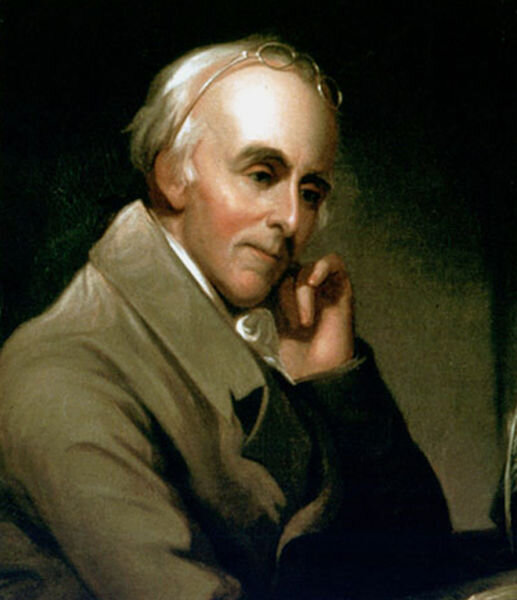
Benjamin Rush
Pennsylvania
“There is no one outside my own family whose friendship was so essential to my happiness.” John Adams wrote these words about Dr. Benjamin Rush. He was a man beloved by people near and honored by many from afar. One example is the number of students he taught at the College (now University) of Pennsylvania. When he began teaching, there were only 20 students in his class. When he lectured for the final time, over 400 students were present. And after his bout with yellow fever, which he contracted while treating patients, he was honored for his work in the field of medicine by foreign dignitaries, including the Czar of Russia.
Dr. Rush was born on December 24, 1745 into a devout Presbyterian family. As a young man, he was quite bright as evidenced by his matriculation from the College of New Jersey (Princeton University) at the age of 15. After completing his medical education, he gained experience abroad in London-based and Parisian hospitals in 1768.
Benjamin Rush returned to Philadelphia the next year and began his medical practice and his professorship of chemistry at the College of Philadelphia. His advocacy against the British crown began in 1773 with essays about the patriot cause published by the newspapers. In June 1776, at a provincial conference, he assisted in writing a resolution declaring Pennsylvanian support for independence. He was not present on July 2nd in the state house when Richard Henry Lee’s resolution for independence was approved. He was elected a delegate after the historic vote, but he was present on August 2nd for the signing of the Declaration of Independence. He joined his father in law, Richard Stockton, and the minister who officiated his wedding, John Witherspoon, for the momentous event.
In a letter addressed to Thomas Jefferson, Dr. Rush spoke of the new republic’s need for a foundation built by Christian principles. “I have always considered Christianity as the strong ground of republicanism. The spirit is opposed, not only to the splendor, but even to the very forms of monarchy, and many of its precepts have for their objects republican liberty and equality as well as simplicity, integrity, and economy in government. It is only necessary for republicanism to ally itself to the Christian religion to overturn all the corrupted political and religious institutions in the world.”
In another place, Benjamin Rush wrote against the “divine right” claims of the British monarchy. “A Christian, I say again, cannot fail of being a republican, for every precept of the Gospel inculcates those degrees of humility, self-denial, and brotherly kindness, which are directly opposed to the pride of monarchy and the pageantry of a court.”
Dr. Rush would go on to serve the colonies and his community in significant fashion. In April, 1777, he was appointed surgeon general of the Continental Army and, three months later, physician general. After the war, in 1786, he opened the first clinic in the new nation in Philadelphia where people could come and receive free medical treatment. When yellow fever epidemic struck his hometown, he worked tirelessly to combat the disease despite being infected himself.
This son of Philadelphia never tired of displaying love to his fellow countrymen and he died serving his city in 1813 during a typhus epidemic. On April 19, Benjamin Rush succumbed to the sickness. His second and third sons would go to contribute significantly to the nation as well. Richard Rush, the second born, was a U.S. Attorney General, a Secretary of the Treasury, and a chief foreign diplomat to Great Britain and France. His third son, James, was also a physician and a philosopher who wrote The Philosophy of the Voice, a seminal work on the physiology and psychology of communicating with the human voice.
Dr. Benjamin Rush lived to be 68 years of age.


